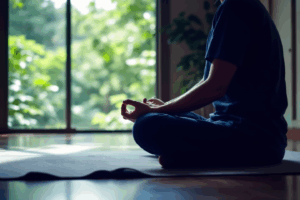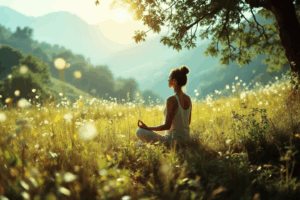
Present Perfect Continuous 6
English Blogs “Let’s Learn, Explore, and Connect to the World” Present Perfect Continuous 6 VI. Expanding Your Practice with the Present Perfect Continuous To master




Being mindful has a significant and complex connection with mental health. Fundamentally, the practice of mindfulness involves being fully present and engaged with our current activity, without any distractions or biases, and being aware of our thoughts and feelings without being consumed by them. This approach, simple yet potent, can have a significant impact on different aspects of our mental well-being. The deep and varied connection between mental health and mindfulness is undeniable. Fundamentally, mindfulness is about being fully involved and present in our current activity, without being distracted or critical, and being mindful of our thoughts and emotions without becoming entangled in them. This straightforward yet effective technique can significantly influence multiple aspects of mental health and wellness. We will learn and explore more about How Mindfulness Can Transform Your Mental Health.
 How Mindfulness Can Transform Your Mental Health by reducing stress and anxiety? For individuals struggling with stress, mindfulness offers a way to pause, observe the present moment, and gain perspective on stressful situations. Cortisol levels, a hormone linked with stress, can be lowered in order to positively impact both physical and mental health. An individual can experience a boost in their overall well-being and decrease the risk of health issues related to stress by managing their stress levels.
How Mindfulness Can Transform Your Mental Health by reducing stress and anxiety? For individuals struggling with stress, mindfulness offers a way to pause, observe the present moment, and gain perspective on stressful situations. Cortisol levels, a hormone linked with stress, can be lowered in order to positively impact both physical and mental health. An individual can experience a boost in their overall well-being and decrease the risk of health issues related to stress by managing their stress levels.
 Mindfulness practices can help alleviate anxiety and depression, which are two of the most prevalent mental health challenges. By fostering an attitude of acceptance toward their emotional states, individuals can experience fewer depressive symptoms and less anxiety-related worry. Mindfulness helps break the cycle of negative thought patterns by teaching practitioners to recognize these thoughts, accept them as temporary, and let them pass without becoming overwhelmed.
Mindfulness practices can help alleviate anxiety and depression, which are two of the most prevalent mental health challenges. By fostering an attitude of acceptance toward their emotional states, individuals can experience fewer depressive symptoms and less anxiety-related worry. Mindfulness helps break the cycle of negative thought patterns by teaching practitioners to recognize these thoughts, accept them as temporary, and let them pass without becoming overwhelmed.

How Mindfulness Can Transform Your Mental Health in connection with emotional regulation. Moreover, mindfulness enhances emotional regulation, helping individuals respond to situations with clarity and insight rather than reacting impulsively. This increased emotional awareness and control can significantly improve interpersonal relationships and self-esteem, contributing to a healthier, more balanced life.
 Personal stories and case studies further illustrate mindfulness’s impact on mental health. Many people have reported that practicing mindfulness has helped them to make significant progress in reducing their symptoms of stress, anxiety, and depression while also increasing their overall happiness and satisfaction with life. The following accounts exhibit how practicing mindfulness can help individuals enhance their mental well-being.
Personal stories and case studies further illustrate mindfulness’s impact on mental health. Many people have reported that practicing mindfulness has helped them to make significant progress in reducing their symptoms of stress, anxiety, and depression while also increasing their overall happiness and satisfaction with life. The following accounts exhibit how practicing mindfulness can help individuals enhance their mental well-being.
By embracing mindfulness, individuals can start on a journey towards greater mental wellness, finding a sense of inner peace, resilience, and a greater appreciation for the richness of life. As people continue to practice mindfulness, they can expect to experience long-lasting benefits that go beyond just temporary relief, leading to better mental health and well-being in the long term.
How Mindfulness Can Transform Your Mental Health by practicing through various techniques, each serving different purposes but aiming to enhance present-moment awareness and acceptance. These methods and tools can assist individuals in selecting the most fitting approach for their needs and lifestyle. Below are some commonly used techniques for mindfulness, as well as resources to support your practice:

The foundation of mindfulness practice. This involves sitting calmly and focusing on thoughts, sounds, breathing sensations, or parts of the body. Mindfulness meditation encourages the observation of wandering thoughts without engaging with them.

A straightforward yet effective technique. Concentrating on your breath can ground you in the present moment, lower stress levels, and promote relaxation. Deep, regular breathing enhances mindfulness and helps with emotional regulation.

This technique involves mentally scanning your body from head to toe, noticing any sensations, tension, or discomfort. The body scan promotes awareness of bodily sensations and can be particularly useful in recognizing and releasing physical tension that you may not have been aware of.

Walking meditation is a form of mindfulness practice that involves walking slowly and deliberately, paying close attention to the movement of your body and the sensation of your feet touching the ground. It combines physical activity with mindfulness, making it an excellent practice for those who find still meditation challenging.
Several apps and online resources are available to assist with mindfulness practice. Here are some popular options:

Headspace, Calm, Insight Timer

https://greatergood.berkeley.edu/, [Mindful.org]

“Mindfulness in Plain English” by Bhante Gunaratana, “Wherever You Go, There You Are” by Jon Kabat-Zinn
Choosing the right technique depends on personal preferences, lifestyle, and specific mental health goals. Experimenting with different practices can help you discover what works best for you, allowing mindfulness to become a more integrated part of your daily life.
By leveraging these techniques and tools, individuals can cultivate a mindfulness practice that fosters mental clarity, emotional stability, and improved well-being. As mindfulness becomes a regular practice, its benefits extend into various aspects of life, contributing to greater happiness, resilience, and overall health.
 The integration of mindfulness into psychological therapy has revolutionized traditional approaches to mental health treatment. Mindfulness-Based Cognitive Therapy (MBCT) is a standout example, combining cognitive behavioral therapy (CBT) principles with mindfulness strategies. Developed to prevent the recurrence of depression, MBCT teaches individuals to disengage from automatic negative thought patterns that can trigger depressive episodes.
The integration of mindfulness into psychological therapy has revolutionized traditional approaches to mental health treatment. Mindfulness-Based Cognitive Therapy (MBCT) is a standout example, combining cognitive behavioral therapy (CBT) principles with mindfulness strategies. Developed to prevent the recurrence of depression, MBCT teaches individuals to disengage from automatic negative thought patterns that can trigger depressive episodes.
 Their sessions, finding that these practices help clients develop a more compassionate and non-judgmental awareness of their thoughts and feelings. Changing one’s perspective is an effective way for people to better manage their emotional reactions and minimize the impact of stressful thoughts and feelings on their mental well-being, which is crucial when it comes to handling stress. This shift in outlook is essential in coping with stress and can result in a more optimistic approach to life. By altering the way they view challenging situations, people can maintain better control over their emotions and avoid harmful thought patterns that can contribute to mental health issues. This shift in mindset is an effective way to manage stress and improve overall well-being.
Their sessions, finding that these practices help clients develop a more compassionate and non-judgmental awareness of their thoughts and feelings. Changing one’s perspective is an effective way for people to better manage their emotional reactions and minimize the impact of stressful thoughts and feelings on their mental well-being, which is crucial when it comes to handling stress. This shift in outlook is essential in coping with stress and can result in a more optimistic approach to life. By altering the way they view challenging situations, people can maintain better control over their emotions and avoid harmful thought patterns that can contribute to mental health issues. This shift in mindset is an effective way to manage stress and improve overall well-being.
 The effectiveness of mindfulness in therapy is supported by a growing body of research. Studies have shown that incorporating mindfulness techniques can result in a notable reduction in symptoms related to anxiety, depression, and PTSD. This makes mindfulness a valuable addition to more conventional therapeutic methods. Furthermore, mindfulness encourages a proactive approach to mental health, empowering individuals with tools they can use outside of therapy to maintain and improve their mental well-being.
The effectiveness of mindfulness in therapy is supported by a growing body of research. Studies have shown that incorporating mindfulness techniques can result in a notable reduction in symptoms related to anxiety, depression, and PTSD. This makes mindfulness a valuable addition to more conventional therapeutic methods. Furthermore, mindfulness encourages a proactive approach to mental health, empowering individuals with tools they can use outside of therapy to maintain and improve their mental well-being.
 By fostering an attitude of acceptance and present-moment awareness, mindfulness in therapy helps individuals confront their challenges with resilience and clarity. This approach not only aids in the healing process but also contributes to a more fulfilling and balanced life.
By fostering an attitude of acceptance and present-moment awareness, mindfulness in therapy helps individuals confront their challenges with resilience and clarity. This approach not only aids in the healing process but also contributes to a more fulfilling and balanced life.
Incorporating mindfulness into therapy reflects a broader understanding of mental health care, one that embraces holistic strategies for healing and wellness. The therapeutic community is recognizing the significance of mindfulness in improving mental health and promoting resilience in the long run. The recognition of mindfulness is growing in the therapeutic community due to the benefits it offers. Mindfulness has been identified as having a significant role in improving mental health and building long-term resilience. As mindfulness continues to be recognized by the therapeutic community, its importance in enhancing mental health and fostering long-term resilience becomes more evident. The therapeutic community is increasingly acknowledging the role of mindfulness in improving mental health and promoting long-term resilience.
Starting a mindfulness practice may seem intimidating initially, but it is possible to begin reaping the rewards of this potent mental health and overall well-being tool by following simple steps. Here is a practical guide to assist novices in commencing their mindfulness journey:

The magnificence of mindfulness is that it doesn’t require hours of your day. Start with just a few minutes each day, gradually increasing the time as you become more comfortable with the practice. Devoting your attention to your breath or environment for a mere five minutes can produce noteworthy results.

It’s possible to practice mindfulness at any time of the day, not just during formal meditation. To achieve this, try to be fully present in whatever activity you’re engaged in, whether it’s eating, walking, or even washing dishes. Take note of the sensations, textures, and sounds around you. This practice can help you integrate mindfulness into your daily life and make it more easily accessible.

Focusing on your breathing is an easy and effective method to practice mindfulness. Focus your awareness on the sensation of air flowing in and out through your nostrils or the motion of your chest rising and falling as you breathe. If you get distracted, simply guide your mind back to your breath. This technique can establish a basis for cultivating heightened consciousness and being present in the moment.

For beginners, guided meditations can be an excellent way to get accustomed to mindfulness practice. Numerous apps and online resources offer guided sessions that can lead you through the basics and help you explore different mindfulness techniques.

Establishing a routine can enhance your mindfulness practice. Try to set aside a specific time and place each day for mindfulness. This consistency helps build the habit and makes it easier to incorporate mindfulness into your life.

Mindfulness is not about achieving perfection or completely clearing your mind of thoughts. It’s normal for the mind to wander. The practice is about noticing when this happens and gently redirecting your attention back to the present. Approach your practice with kindness and patience, understanding that it’s a skill that develops over time.

Recording your experiences can be a helpful way to observe your progress and reflect on your practice. Note any changes in your mental state, challenges you faced, and how mindfulness is impacting your daily life.

Participating in a group or class can provide support and deepen your practice. Learning from experienced instructors and sharing experiences with others can be incredibly beneficial, especially when starting out.
 It’s natural to encounter obstacles in your mindfulness practice. You might find it difficult to focus, experience restlessness, or doubt its benefits. Recognizing these challenges as part of the journey and remaining committed to your practice is crucial. Remember, mindfulness is about the journey, not the destination. As you keep up with your mindfulness practice, you will gradually start to observe its remarkable effects on your general well-being and quality of life. Over time, mindfulness will become an integral part of your daily routine, enabling you to experience its profound benefits firsthand.
It’s natural to encounter obstacles in your mindfulness practice. You might find it difficult to focus, experience restlessness, or doubt its benefits. Recognizing these challenges as part of the journey and remaining committed to your practice is crucial. Remember, mindfulness is about the journey, not the destination. As you keep up with your mindfulness practice, you will gradually start to observe its remarkable effects on your general well-being and quality of life. Over time, mindfulness will become an integral part of your daily routine, enabling you to experience its profound benefits firsthand.
By following these steps, beginners can set a solid foundation for their mindfulness practice, opening the door to a transformative journey toward greater peace, resilience, and happiness.
After introducing some foundational mindfulness techniques, let’s explore additional methods and tools that can further support and enrich your mindfulness practice:

This technique involves using your imagination to transport yourself to a place of peace and tranquility, all while focusing on enhancing your sense of presence. Engaging the mind in positive and soothing scenarios can be a great way to reduce stress and anxiety. This technique has been found to be particularly effective in helping people manage their mental health. Audio recordings or apps that guide you through picturesque landscapes or serene environments can be helpful tools for this practice.

Paying complete attention to the act of consuming food and observing its colors, smells, textures, and flavors, along with the body’s hunger and fullness signals, is known as mindful eating. This technique can transform meal times into a meditation of their own, promoting a healthier relationship with food and aiding in digestion.

Yoga combines physical postures, breathing exercises, and meditation to enhance well-being. The deliberate and focused movements of yoga require present-moment awareness, making it an excellent practice for cultivating mindfulness while also benefiting the body.

In an age where digital distractions are constant, setting aside time for a digital detox can be a valuable mindfulness tool. This involves taking deliberate breaks from electronic devices to reconnect with the present moment, reduce stress, and improve focus and relationships.

Numerous apps and websites offer guided meditations, mindfulness exercises, and educational content to support your practice. Utilizing resources that provide a range of techniques can assist in exploring various facets of mindfulness and ensuring that your practice remains dynamic and captivating. Some examples are included earlier in the post, but consider adding a sentence here to suggest users explore those options.

For those looking to deepen their practice, mindfulness retreats offer immersive experiences, often in serene settings that facilitate reflection and growth. These retreats provide structured mindfulness training, the opportunity to practice with experienced teachers, and the support of a mindful community.

The field of mindfulness is ever-evolving, with new research, techniques, and insights emerging regularly. Engaging with books, podcasts, and workshops on mindfulness can provide ongoing inspiration and deepen your understanding and practice.
By integrating these techniques and tools into your life, mindfulness can become a rich and varied practice that not only enhances your mental health but also enriches your daily experiences. Remember, the key to mindfulness is consistent practice and exploration, finding what works best for you, and adapting your practice as your needs and circumstances change.
 Mindfulness offers a profound tool for navigating the complexities of modern life with grace and resilience. By anchoring us in the present moment, mindfulness cuts through the noise of daily distractions and unveils a space of clarity and calm within ourselves. This journey, though personal and unique for each individual, holds universal truths about the power of awareness, acceptance, and the capacity for transformation.
Mindfulness offers a profound tool for navigating the complexities of modern life with grace and resilience. By anchoring us in the present moment, mindfulness cuts through the noise of daily distractions and unveils a space of clarity and calm within ourselves. This journey, though personal and unique for each individual, holds universal truths about the power of awareness, acceptance, and the capacity for transformation.
 Now that we see How Mindfulness Can Transform Your Mental Health by looking at the benefits of mindfulness extend far beyond the moments of meditation; they weave through every aspect of our lives, enhancing our relationships, productivity, and overall satisfaction. As we move forward, the invitation is to continue exploring mindfulness with curiosity and openness, integrating its practices into our daily routines and moments of need.
Now that we see How Mindfulness Can Transform Your Mental Health by looking at the benefits of mindfulness extend far beyond the moments of meditation; they weave through every aspect of our lives, enhancing our relationships, productivity, and overall satisfaction. As we move forward, the invitation is to continue exploring mindfulness with curiosity and openness, integrating its practices into our daily routines and moments of need.
 The path of mindfulness is one of continuous discovery and growth. There may be challenges and setbacks, but each step taken is a step toward greater mental health and a fuller, more engaged life. Let mindfulness be your guide, a constant cowell-being in the pursuit of well-being and inner peace.
The path of mindfulness is one of continuous discovery and growth. There may be challenges and setbacks, but each step taken is a step toward greater mental health and a fuller, more engaged life. Let mindfulness be your guide, a constant cowell-being in the pursuit of well-being and inner peace.
In embracing mindfulness, we not only transform our own lives but contribute to a more mindful, compassionate world. The journey begins with a single breath, a single moment of awareness. Where it leads, is boundless.

English Blogs “Let’s Learn, Explore, and Connect to the World” Present Perfect Continuous 6 VI. Expanding Your Practice with the Present Perfect Continuous To master

Mental and Emotional Health “Let’s Learn, Explore, and Connect to the World” The Ultimate Guide to Managing Anxiety: Strategies and Tools Introduction Anxiety, often misunderstood,

“English Article Collection: Understanding Business and Social Media Today” is your gateway to mastering this dynamic world. This meticulously curated compilation is more than just a book; it’s a journey through the realms of business awareness and social media savvy, presented in a language that speaks to beginners and experts alike.



